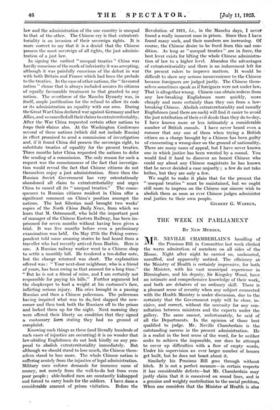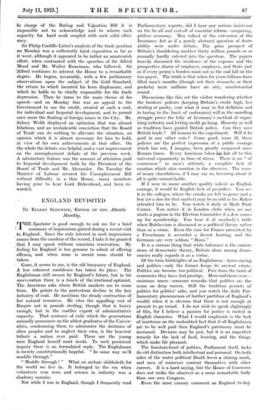THE WEEK IN PARLIAMENT
BY NEW MEMBER.
TR. NEVILLE CHAMBERLAIN'S handling of 1T-L the Pensions Bill in Committee last week elicited the warm admiration of members on all sides of the House. Night after night he carried on, undaunted, unruffled, and apparently untired. The efficiency at the Ministry of Health is certainly impressive, for both the Minister, with his vast municipal experience in Birmingham, and his deputy, Sir Kingsley Wood, have an intimate and comprehensive knowledge of their work, and both are debaters of no• ordinary skill. There is a pleasant sense of security when any subject connected with the Health Ministry is under discussion, due to the certainty that the Government reply will be clear, in- cisive, and correct, without the necessity for any con- , sultation between ministers and the experts under the gallery. The same cannot, unfortunately, be said of all the Departments. In the opinion of those best qualified to judge. Mr. Neville Chamberlain is the outstanding success in the present administration. He is a realist in the best sense of the word, for he neither seeks to achieve the impossible, nor does he attempt to cover up difficulties with a flow of empty words. Under his supervision an ever larger number of houses get built, but he does not boast about it.
Similarly his Pensions Bill goes through without hitch. It is not a perfect measure—in certain respects it has considerable defects—but Mr. Chamberlain may justly claim that it is conceived on sound lines, and is a- genuine and weighty contribution to the social problem; When one considers that the Minister of Health is also 4n charge of the Rating and Valuation Bill it is impossible not to acknowledge and to admire such capacity for hard work coupled with such solid effici- ency.
Sir Philip Cunliffe-Lister's analysis of the trade position on Monday was a sufficiently lucid exposition as far as it went, although it appeared to be rather an amateurish effort, when contrasted with the speeches of Sir Alfred Mond and Mr. Walter Runciman, who followed. Sir ~Alfred continues to interest the House to a remarkable degree. He begins, invariably, with a few preliminary observations upon the subject of the Gold Standard, the return to which incurred his keen displeasure, and which he holds to be chiefly responsible for the trade depression. Then he turns to the main theme of his speech—and on Monday this was an appeal to the Government to use the credit, created at such a cost, for individual and Imperial development, and to permit once more the floating of foreign issues in the City. Mr. Sidney Webb displayed an optimism that was almost hilarious, and an unshakeable conviction that the Board of Trade can do nothing to alleviate the situation, an opinion which it is almost necessary for him to hold, in view of his own achievements at that office. On the whole the debate was helpful, and a vast improvement on the unemployment debate of the previous week. A satisfactory feature was the amount of attention paid to Imperial development both by the President of the Board of Trade and Mr. Alexander. On Tuesday the Minister of Labour secured his Unemployment Bill without difficulty in a thin House, many members having gone to hear Lord Birkenhead, and been re- warded.



























































 Previous page
Previous page